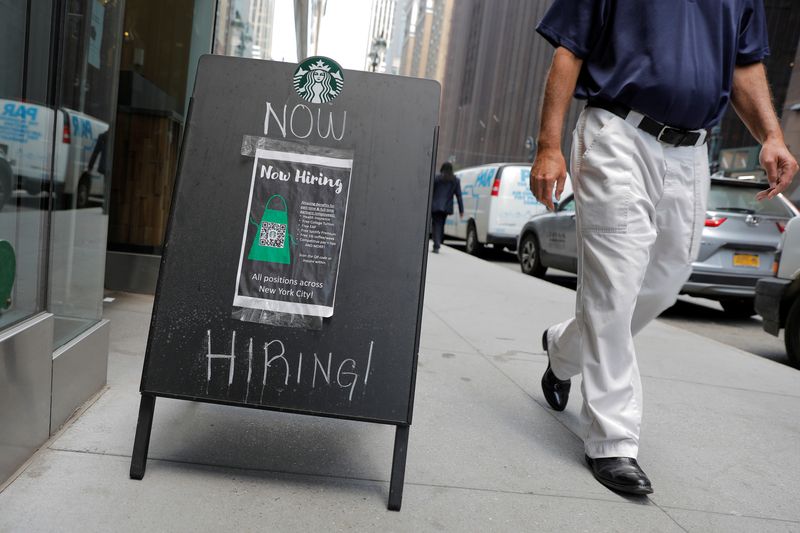By Lucia Mutikani
WASHINGTON (Reuters) - The number of Americans filing new claims for unemployment benefits increased moderately last week, suggesting that the labor market was gradually losing momentum as higher borrowing costs curb demand in the broader economy.
The weekly jobless claims report from the Labor Department on Thursday also showed unemployment rolls declining in late November after the so-called continuing claims hit a two-year high in the middle of the month.
While the mixed report supported economists' views that the Federal Reserve was likely done raising interest rates this cycle, it suggested that financial market expectations of a cut as early as the first quarter were premature.
"There is no cumulative deterioration yet in the labor market that has caused previous Fed chairs to pivot quickly from rate hikes to rate cuts to support the economy," said Christopher Rupkey, chief economist at FWDBONDS in New York. "The data will keep the Fed on the sidelines watching carefully with the risks of doing too much or too little roughly balanced."
Initial claims for state unemployment benefits rose 1,000 to a seasonally adjusted 220,000 for the week ended Dec. 2, the Labor Department said on Thursday. Economists polled by Reuters had forecast 222,000 claims for the latest week.
Claims data are volatile around this time of the year because of holidays, making it harder to get a clear signal on the labor market. The volatility is likely to persist into early January.
Unadjusted claims increased 93,761 to 293,511 last week. Claims in California surged 14,057 while filings in New York soared 9,343. Texas reported a 7,698 jump in claims and applications increased 6,481 in Georgia. Nearly a dozen other states, including Illinois, Indiana, Pennsylvania and Oregon reported an increase in claims above 2,000.
"Looking past the noise, initial claims remain at a level that is consistent with relatively low layoffs," said Nancy Vanden Houten, lead U.S. economist at Oxford Economics.
A separate report from global outplacement firm Challenger, Gray & Christmas on Thursday showed U.S.-based employers announced 45,510 job cuts in November, up 24% from October. But planned layoffs dropped 41% compared to a year ago.
The government reported this week that there were 1.34 job openings for every unemployed person in October, the lowest since August 2021. Slowing economic activity was highlighted by a third report on Thursday from the Commerce Department's Census Bureau showing wholesale inventories declining 0.4% in October, instead of falling 0.2% as estimated last month.
Economists expect business inventories to subtract from gross domestic product in the fourth quarter. Private inventory investment contributed 1.40 percentage points to the economy's 5.2% annualized growth pace in the third quarter. Growth estimates for the October-December quarter are below a 2% rate.
Stocks on Wall Street were trading higher. The dollar fell against a basket of currencies. U.S. Treasury yields rose.
FED LIKELY ON HOLD
With the labor market not falling off the rails, most economists are not predicting a recession. Loosening labor market conditions together with subsiding inflation have led financial markets to conclude that the Fed's monetary policy tightening campaign is over. Financial markets are anticipating a rate cut as soon as the first quarter of 2024, according to CME Group's (NASDAQ:CME) FedWatch Tool.
The U.S. central bank is expected to leave rates unchanged next Wednesday. Since March 2022, the Fed has raised its policy rate by 525 basis points to the current 5.25%-5.50% range.
The number of people receiving benefits after an initial week of aid, a proxy for hiring, dropped 64,000 to 1.861 million during the week ending Nov. 25, the claims report showed. Continuing claims jumped to a two-year high in the prior week.
They have mostly increased since mid-September, blamed largely on difficulties adjusting the data for seasonal fluctuations after an unprecedented surge in filings for benefits early in the COVID-19 pandemic.
Economists at Goldman Sachs have estimated that seasonal distortions accounted for the 203,000 increase in continuing claims since early September, and expected them to raise the level by an additional 125,000 by next March.
"The jobs market has softened a little more than recent initial claims readings might suggest, but the surge in continuing claims since Labor Day vastly overstates the deterioration," said Lou Crandall, chief economist at Wrightson ICAP (LON:NXGN) in New York. "The sustained increase in the reported number of beneficiaries reflects seasonal adjustment distortions that will be smoothed out in future revisions."
The claims data have no bearing on November's employment report scheduled to be released on Friday as they fall outside the survey period.

Nonfarm payrolls are estimated to have increased by 180,000 jobs in November, according to a Reuters survey of economists, boosted by the return of 25,300 United Auto Workers union members as well as 16,000 actors after strikes ended.
The economy created 150,000 jobs in October. The unemployment rate is forecast unchanged at 3.9%.